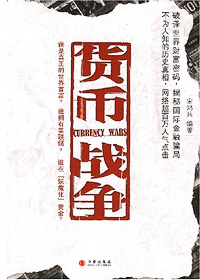Black helicopters, U.N. conspiracies and shadowy cabals of all-powerful financiers – this is the stuff that fixates in the feverish imagination of a certain segment of the American populace.
In one of those wonders of globalization (and ideological indoctrination), those same shadowy cabals do double duty as the object of much Chinese paranoia. This is manifest in the tremendous sales of the book series “Currency Wars,” which indulges such delusions and gives them a veneer of academic respectability. The books’ author Song Hongbing lays out in great detail how Western investment bankers, having controlled the course of world history for some two hundred years, are now intent on engineering China’s collapse for their own profit (here’s a post by a China-based U.S. economist on the subject).

"Currency Wars"
The real world consequences of this peculiar vein of thought was on display this past week as China’s plans for RMB revaluation were reportedly delayed by a storm of unfavorable public opinion, according to the New York Times. One Internet rumor that went viral last weekend held that the plan was an American ruse to “to create an economic bubble and financial crisis in China.” Just as the Ministry of Commerce came around to the consensus view that some strengthening of the RMB would be in China’s interest, the government was tripped up by the deep suspicion of the West it has inculcated in its populace.
The whole affair could be a great case study of the tortured dynamics between Chinese public opinion, its government management and foreign policy decision-making. Here Wen Jiabao and the highest echelons of the Chinese government, up until last week complicit in a defiant media blitz painting the RMB as a sovereignty issue, clearly were in a pickle once they wanted to change course. Then again, they may well have intentionally whipped up public sentiment to feign powerlessness in private conversations with pushy diplomats.
The received wisdom in Chinese political studies is that while the government is beholden to public opinion in the short term, it has plenty of latitude to mold that opinion in the long run. Brookings’ China center director Kenneth Lieberthal said so much in a D.C. forum on March 18, adding “what opinion really counts for actual concrete policymaking in China, I think it’s overwhelmingly public opinion at the highest levels of the system, not out in the broad masses of the population.” The opposition of the masses to any given policy is thus only a temporary obstacle – it can be assuaged in due time with corrective public opinion management, which is already evident with the RMB issue in newspaper commentary sections.
The first caveat to this dynamic is that mortal suspicion of the West is the one variable of public opinion China’s thought-managers are loath to play with. Especially in the present moment of domestic uncertainty, the party has a vital interest in playing up its image as lone bulwark against a rapacious West. This is glaringly evident in a Tuesday Global Times op-ed that, instead of defusing paranoia about the West, actually fans the craziness but channels it into an argument for RMB revaluation.
In “America is exporting inflation to slow China’s rise,” Zhang Jiye (whose work I’ve explored in the past) argues that the “secret [U.S.] plot” to sabotage China’s economic growth is actually to force crippling inflation into China through the fixed exchange rate, not wreak havoc through RMB revaluation. Never mind that no one forces China to maintain a currency peg, or that Zhang contradicts his conclusion by saying several times how a weakening dollar would hurt China. The point is the only way to prevent this vast and evil stratagem is in fact to decouple the RMB from the dollar.
Evidently, China’s leadership doesn’t find it prudent to dampen the rabid paranoia, or perhaps thinks it’s still too soon to do so credibly. Either way, Zhang’s bravura piece of spin, which would probably earn him respect from the sleaziest U.S. politicos, underscores the messiness of public opinion management in action. Breathing room to strengthen the RMB is created but leeway to appear conciliatory to the U.S. or Europe is taken away.
It could be that Zhang’s views are actually shared in some quarters of Zhongnanhai, among the top leadership. We know that opinion at the “highest levels of the system,” in Lieberthal’s terms, is actually quite divided on key issues (especially economics and foreign policy), nor should we be surprised if ingrained suspicion against the West has crept into the worldview of China’s most powerful decision-makers.
The second caveat about China’s ability to mold public opinion in the long run is then that, as the leadership cannot always be of one mind about everything, we should not be surprised if the Party’s opinion management work reflects this indecision. The validity of the conventional wisdom is contingent on elite opinion being unified; otherwise, the sentiments of the masses may yet prove to be a wildcard in foreign policymaking.